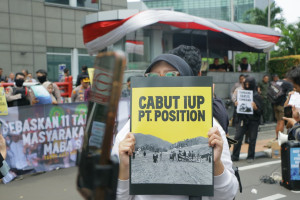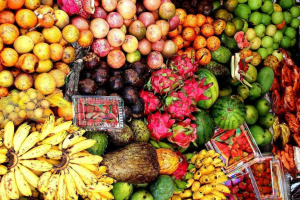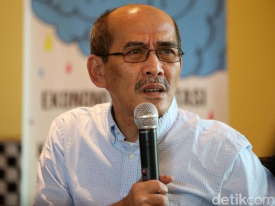Civil society coalition occupies EV Exhibition in Jakarta
The Civil Society Coalition, together with residents living around nickel mining concessions in Central Sulawesi, Southeast Sulawesi and North Maluku, occupied the electric vehicle (EV) exhibition held by the Indonesian Electric Vehicle Association (Periklindo) at the Jakarta International Expo (JiExpo) Kemayoran, in Central Jakarta on Sunday, May 5, 2024.
This action was a culmination of the residents' agenda in Jakarta after staging the Bloody Nickel Counter-Exhibition: The Dark Side of Electric Vehicles, at the Taman Ismail Marzuki (TIM) art and cultural center in Central Jakarta on May 3-4, 2024.
Hema Situmorang, an activist with the Mining Advocacy Network (Jatam) and representative of the coalition, said the trend of using electric vehicles in Indonesia has increased significantly by 2023. This can be seen from the manufacturer-to-distributor (wholesale) sales which have increased every year.
"Data from the Indonesian Automotive Industry Association (Gaikindo), throughout 2023 the sales volume of battery electric vehicles (BEV) in Indonesia reached 17.06 thousand units. This is a 65.2 percent increase from 2022 and a new record high," Hema said.
The presence of a number of policies such as the implementation of incentives for the purchase of battery-based electric vehicles to Value Added Tax (VAT) which is considered to stimulate the market and industry, is one of the government's efforts to encourage the country to become a major player in this business. For example, a Rp 7 million subsidy is provided by the Indonesian government for the purchase of an electric motorbike, which is instipulated in the Minister of Industry Regulation No. 21/2023 on Amendments to Minister of Industry Regulation No. 6/2023 concerning Guidelines for Providing Government Assistance for the Purchase of Two-Wheeled Battery-Based Electric Vehicles.
For four-wheeled vehicles, Minister of Finance Regulation (PMK) No. 8/2024 and No. 9/2024 provide incentives for people who want to buy electric cars in the form of a 10-percent VAT reduction. There are two electric car brands that are confirmed to receive subsidies, namely Hyundai Ioniq 5 with a discount of Rp 70 - 80 million and Wuling Air ev with a price reduction of Rp 25 million - Rp 35 million.
The problem is, Hema said, the ambition to make Indonesia a major player in the EV industry under the pretext of energy transition, which is even claimed to be a symbol of a low-carbon economy, does not pay attention to the environmental damages incurred in the process of fulfilling the basic materials of electric vehicles such as nickel, cobalt and the raw material processing industry (smelter).
While the extraction of minerals and metals has been achieved through mining and dismantling of minerals and metals, the negative impacts have always been underestimated, even though the entire supply chain relies on thousands of extraction sites and the expansion of life-destroying infrastructure and logistics. Nickel extraction by national and multinational companies has left a long and irreversible legacy of destruction.
"The extractive industry of nickel mining requires large-scale land clearing, polluting water, air and seas with impacts on the health of citizens and ecosystems, clearing forest areas that trigger deforestation, and successive violence against local communities. The operation of the nickel mining and smelter industry, whose entire electrical energy supply is also sourced from coal, requires the dismantling of other islands rich in coal," Hema said.
Clear examples of this reality occur in Lelilef and Gemaf in Central Halamhera, where PT IWIP operates, or in Kawasi, Obi island, South Halmahera, where the Harita Group operates. These two are areas where nickel extraction and the operation of smelters and power plants have left damages, losses and diseases that are difficult to recover from, as well as eliminated the people's veto rights.
In contrast, various incentives through policies and regulations, including investment security guarantees continue to be provided by the government to these industry players. For this reason, the agenda of this destructive power exhibition aims to expose how the practice of fulfilling the basic ingredients of electric batteries, which are also important variables in the electric vehicle itself, has sacrificed the living space of citizens and the environment.
It is the same in eastern Halmahera, where PT ANTAM operates. Nickel mining has occupied land, polluted coastal and marine waters, and devastated small islands, such as Gee island and Pakal island. Now, these environmental and humanitarian crimes are being exacerbated by PT Priven Lestari's planned nickel mining at Mount Watwato. Mount Watowato is the only source of water for nearly 20,000 residents in Maba sub-district. The same water source is also used by residents in Subaim, Wasile District, one of the most important food (rice) barns in North Maluku.
Nickel downstreaming impoverishes residents, bankrupts the State
Based on data from Statistics Indonesia (BPS), downstreaming at nickel centers has triggered poverty for residents. In a period between September 2022 and September 2023, poverty rate in Central Sulawesi has increased by around 0.11 percent points from 12.30 percent to 12.41 percent, followed by South Sulawesi with an increase of 0.04 percent points from 8.66 percent to 8.70 percent, and North Maluku by 0.09 percentage points from 6.37 percent to 6.46 percent.
"The operation of the nickel mining and smelter industry, where the entire supply of electrical energy is also sourced from dirty coal energy. Factually, this condition has triggered bankruptcy for the state, given the huge subsidies given to businesses that claim to add value to nickel. The need for massive coal consumption will also require the dismantling of other coal-rich islands, and all of this destruction is never considered part of the state's losses, all of which are borne by local residents," Hema cited.
An example of such reckless subsidisation is that in 2022, the average price of coal on the international market (Australian coal) reached US$345 per ton. Meanwhile, in the same year, the government set the coal price at only US$70 per ton under the pretext of national strategic projects (PSN) and domestic market obligation (DMO). So the coal subsidy per ton reached US$275. If calculated, the total DMO realization in the same year was 218.81 tons, which means that the total state subsidy to these dirty business players in a year-long period reached US$59,347.75.
Another factor that should be taken into account is the ecological loss as a result of the destruction of environmental metabolism, which is also caused by the reckless dismantling of nickel and coal as primary materials for energy generation, just to fulfil the ambitions of this extractive business. There are so many things at stake, be it the memory and living space of citizens, intergenerational injustice to the growing social-ecological debt.
Tag
Already have an account? Sign In
-
Start reading
Freemium
-
Monthly Subscription
20% OFF$29.75
$37.19/MonthCancel anytime
This offer is open to all new subscribers!
Subscribe now -
Yearly Subscription
33% OFF$228.13
$340.5/YearCancel anytime
This offer is open to all new subscribers!
Subscribe now







